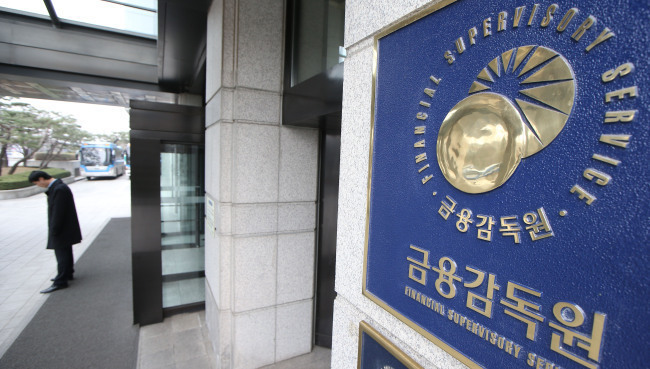The Financial Supervisory Service said Friday it would seek pre-emptive measures to protect savings banks against side effects from the government’s anticipated move to lower the limit on their maximum interest rates.
The FSS said in a press release that a lower ceiling for lending rates may dent savings banks’ financial health.
The regulator said the stricter lending rate ceiling would pull down the profitability of the banks, which had shown sound financial health in the first quarter.
Setting the ceiling for the maximum lending rate of secondary financial entities, including savings banks and loan sharks, has been considered one of the key pledges of President Moon Jae-in during his election campaign. The pledge aimed to relieve the burden of low-credit borrowers and cope with snowballing household debt.
The FSS said in a press release that a lower ceiling for lending rates may dent savings banks’ financial health.
The regulator said the stricter lending rate ceiling would pull down the profitability of the banks, which had shown sound financial health in the first quarter.
Setting the ceiling for the maximum lending rate of secondary financial entities, including savings banks and loan sharks, has been considered one of the key pledges of President Moon Jae-in during his election campaign. The pledge aimed to relieve the burden of low-credit borrowers and cope with snowballing household debt.

The FSS vowed to take pre-emptive action, such as gradually toughening the criteria to assess lenders’ financial soundness, to “the level of primary lenders.”
As part of the measures, savings banks’ loans overdue for one month are now, since April, classified as special mention assets. Previously, the classification did not kick in until two months of delinquency.
Savings banks in Korea showed sound financial health in the first quarter backed by the rise in their net profits, data from the FSS showed Friday.
The 79 savings banks’ net profits surged 13.6 percent on-year on the back of robust interest income, up 135.5 billion won ($120.9 million) or 18.8 percent from the first quarter in 2016, dwarfing the rise in bad debts expense by 52.9 billion won or 27.7 percent.
The secondary financial lenders’ delinquency rate of household loans shed 0.3 percent on-quarter, mainly due to the improvement in mortgage loans and household credits, whose overdue rate was down 0.3 percent and 0.4 percent, respectively, showed the preliminary data from the FSS.
The delinquency rate on all credit remained flat at 5.8 percent, compared to the previous quarter, due to an uptick in the corporate loan overdue rate.
The average Bank for International Settlements capital adequacy ratio edged down by 0.07 percent on-quarter to 13.88 percent. The volume of risk-weighted assets rose 2 trillion won, or 4.7 percent, outpacing that of the increase in BIS capital retention by 200 billion won, or 4.1 percent.
Net assets soared 2.5 percent on-quarter, while net equity rose 3.2 percent. By Son Ji-hyoung (consnow@heraldcorp.com)
As part of the measures, savings banks’ loans overdue for one month are now, since April, classified as special mention assets. Previously, the classification did not kick in until two months of delinquency.
Savings banks in Korea showed sound financial health in the first quarter backed by the rise in their net profits, data from the FSS showed Friday.
The 79 savings banks’ net profits surged 13.6 percent on-year on the back of robust interest income, up 135.5 billion won ($120.9 million) or 18.8 percent from the first quarter in 2016, dwarfing the rise in bad debts expense by 52.9 billion won or 27.7 percent.
The secondary financial lenders’ delinquency rate of household loans shed 0.3 percent on-quarter, mainly due to the improvement in mortgage loans and household credits, whose overdue rate was down 0.3 percent and 0.4 percent, respectively, showed the preliminary data from the FSS.
The delinquency rate on all credit remained flat at 5.8 percent, compared to the previous quarter, due to an uptick in the corporate loan overdue rate.
The average Bank for International Settlements capital adequacy ratio edged down by 0.07 percent on-quarter to 13.88 percent. The volume of risk-weighted assets rose 2 trillion won, or 4.7 percent, outpacing that of the increase in BIS capital retention by 200 billion won, or 4.1 percent.
Net assets soared 2.5 percent on-quarter, while net equity rose 3.2 percent. By Son Ji-hyoung (consnow@heraldcorp.com)








![[Graphic News] More Koreans say they plan long-distance trips this year](http://res.heraldm.com/phpwas/restmb_idxmake.php?idx=644&simg=/content/image/2024/04/17/20240417050828_0.gif&u=)
![[KH Explains] Hyundai's full hybrid edge to pay off amid slow transition to pure EVs](http://res.heraldm.com/phpwas/restmb_idxmake.php?idx=644&simg=/content/image/2024/04/18/20240418050645_0.jpg&u=20240419100350)






![[From the Scene] Monks, Buddhists hail return of remains of Buddhas](http://res.heraldm.com/phpwas/restmb_idxmake.php?idx=652&simg=/content/image/2024/04/19/20240419050617_0.jpg&u=20240419175937)

![[KH Explains] Hyundai's full hybrid edge to pay off amid slow transition to pure EVs](http://res.heraldm.com/phpwas/restmb_idxmake.php?idx=652&simg=/content/image/2024/04/18/20240418050645_0.jpg&u=20240419100350)

![[Today’s K-pop] Illit drops debut single remix](http://res.heraldm.com/phpwas/restmb_idxmake.php?idx=642&simg=/content/image/2024/04/19/20240419050612_0.jpg&u=)